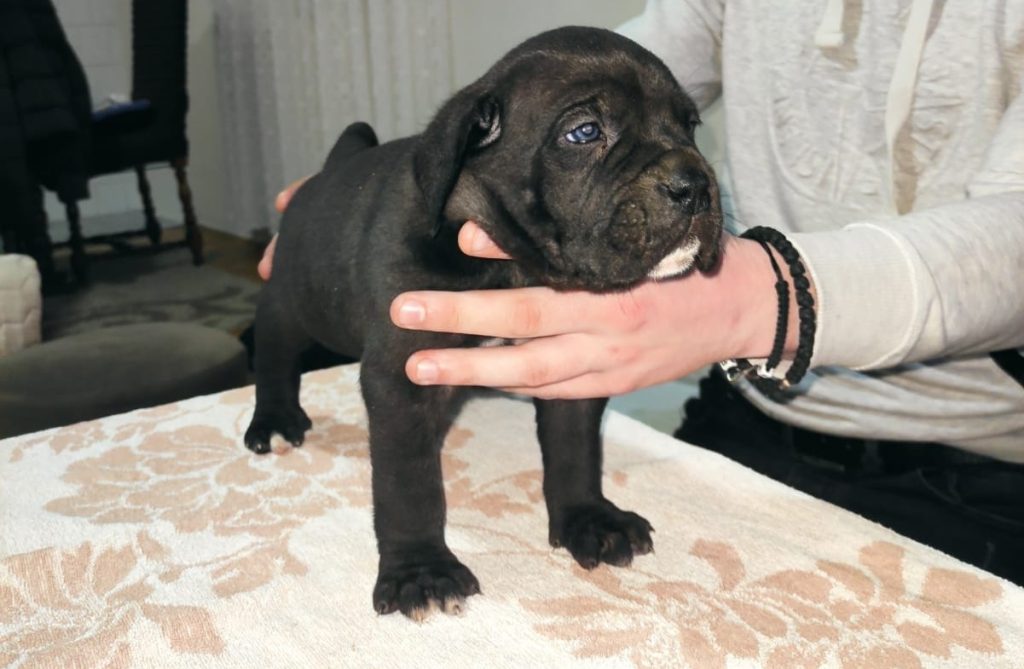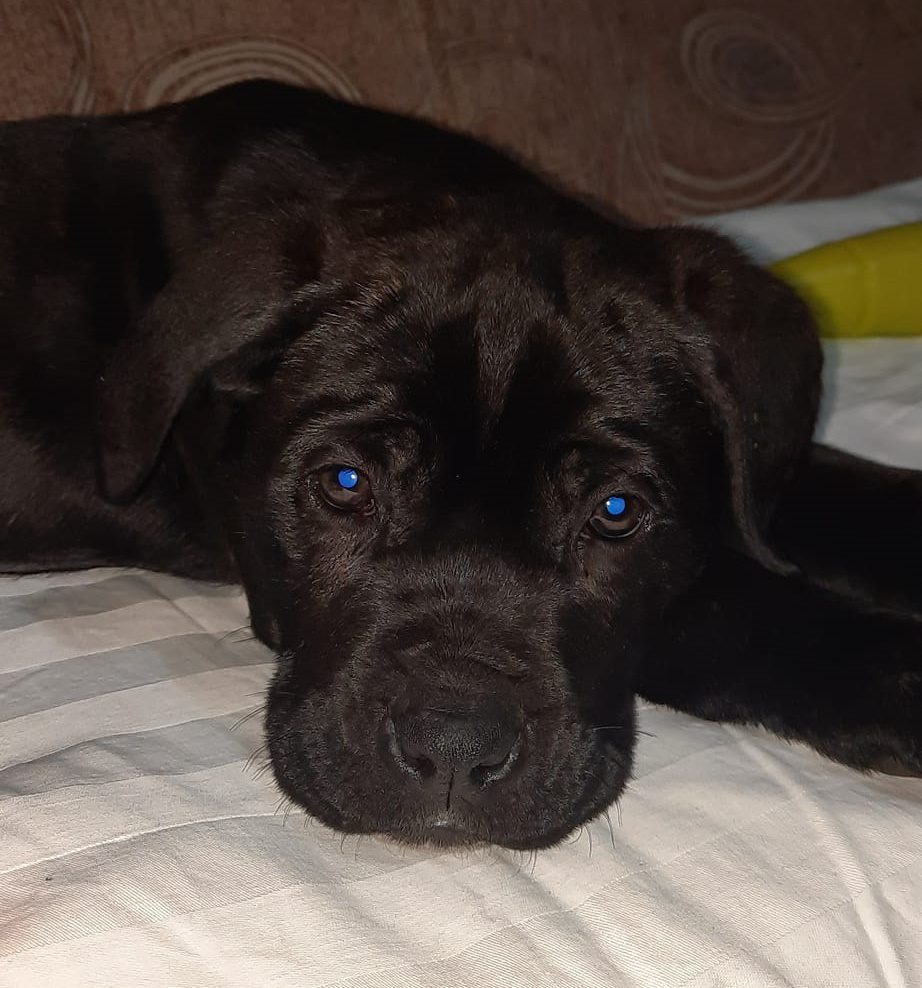All puppies bite. It’s a natural part of their development. But when do Cane Corso puppies stop biting? How can you stop your puppy from biting?
Cane Corso puppies are known for being very playful and full of energy. They love to chew on things, and sometimes this can include human skin!
In this comprehensive guide, we will answer all of your questions about Cane Corso‘s puppy-biting behavior!
Key Takeaway
- Cane Corso puppies generally stop biting when they are around six to eight months old, as they should have finished teething by this age.
- Puppies should naturally slow down and stop biting around 7 months of age, when all of their adult teeth are in.
- Training a Cane Corso puppy not to bite involves teaching bite inhibition, providing plenty of stimulation and exercise, using firm commands, redirecting to chew toys, maintaining consistency in training, and socializing the puppy with other dogs.
When Do Cane Corso Puppies Stop Biting?

In general, Cane Corso puppies stop biting when they are around six to eight months of age. At this age, they should already have finished teething, which is usually the most common reason why puppies bite all the time. However, it’s important to nip this behavior in the bud early on so that your dog grows up to be a well-mannered adult.
The Cane Corso puppies will continue to bite for a much longer time if proper training is not introduced while the pup is still young. This isn’t something related to their breed only. It is safe to say that all puppies tend to bite when they are going through teething.
Cane Corso and other puppies tend to bite a lot when they are going through the teething process. This process usually ends before the puppy is one year of age.
The Cane Corso is a very independent-thinking dog breed. As they grow, they still test you all the time just to see where they stand on boundaries. This can be very challenging for the owners but good training and the right chew toys will help a lot.
It is very important and helpful for owners to have the right mindset and attitude about this phase in their puppy’s life. Every time you train your puppy to do something, you need to have patience.
Stress anger or harsh treatment can be very harmful and that will send your Cane Corso a wrong message. If a Cane Corso bites their loved ones, they need to let the puppy know that biting is not allowed.
At What Age Should I Stop My Puppy From Biting?
Puppies should be trained to stop biting between the age of four and six months, when they’ve lost all their baby teeth and have their adult teeth.
During the first few months of a puppy’s life, it is normal for them to explore their world by mouthing and biting.
However, as they grow older and their teeth become stronger, biting can become harmful.
Therefore, it’s important to start training your puppy to stop biting between the ages of four and six months.
This is typically the time when puppies lose all their baby teeth and have their full set of adult teeth. Training at this stage helps them understand that biting is not an acceptable behavior.
It’s crucial to use positive reinforcement techniques during this training, such as rewarding your puppy when they chooses to chew on toys instead of biting.
How Do I Train My Cane Corso Puppy NOT To Bite?

Training a Cane Corso puppy not to bite involves consistent redirection, positive reinforcement, and teaching bite inhibition.
1. Redirection
Redirect your puppy’s biting behavior towards acceptable objects like toys. When your puppy starts to bite, give them a chew toy instead. This helps them understand what they can and cannot bite.
2. Positive Reinforcement
Reward your puppy when they make the right choice. If they choose to chew on their toy instead of biting you, give them a treat or praise them. This will motivate them to repeat the good behavior.
3. Bite Inhibition
Teach your puppy bite inhibition. This means teaching them to control the force of their mouth when interacting with people and other animals.
You can do this by letting out a high-pitched yelp whenever they bite too hard during play. This mimics the response they would get from another puppy and teaches them that biting too hard isn’t acceptable.
4. Consistency
Keep the training consistent. Make sure everyone in your household is on the same page and follows the same rules regarding puppy biting. Consistency is key in ensuring that your puppy learns the expected behavior.
5. Professional Help
If your puppy’s biting behavior continues despite your efforts, consider seeking professional help. A professional dog trainer or behaviorist can provide guidance and develop a personalized training plan for your puppy says One Mind Dogs.
The Puppy Teething Process
The puppy teething process involves the growth and eventual replacement of a puppy’s baby teeth with their permanent adult teeth.
1. Birth to Two Weeks
At birth, puppies have no teeth. They rely entirely on their mother’s milk for nourishment during these initial weeks.
2. Two to Four Weeks
During this period, a puppy’s first set of teeth, also known as deciduous or baby teeth, begin to erupt. These are usually the incisors, the small teeth at the front of the mouth.
3. Four to Six Weeks
By this time, all 28 baby teeth should have erupted. These include the incisors, canines (the long, pointy teeth), and premolars.
4. Three to Six Months
This is when the teething process begins in earnest. The baby teeth start to fall out to make way for the adult teeth. This is often a discomforting period for puppies, and they may chew more during this time to alleviate the discomfort.
5. Six to Eight Months
By this time, most puppies should have a full set of adult teeth. In total, adult dogs have 42 teeth. It’s important to start good dental hygiene practices at this stage to ensure the health and longevity of these permanent teeth.
6. Regular Dental Check-ups
Even after the teething process is complete, it’s crucial to maintain regular dental check-ups with a vet. This helps to monitor your dog’s oral health and catch any potential issues early.
FAQs
Q: Why do Cane Corso puppies bite?
A: Cane Corso puppies often bite as a natural part of their teething process and play behavior. They explore the world with their mouths and use biting as a way to interact and learn.
Q: Is it normal for Cane Corso puppies to bite?
A: Yes, it is normal for Cane Corso puppies to bite. However, it is essential to teach them appropriate biting behavior to prevent any potential issues in the future.
Q: How should I socialize my Cane Corso puppy to prevent biting?
A: Socialization is crucial in preventing biting behavior in Cane Corso puppies. Introduce them to various people, animals, and environments to help them become well-adjusted and confident.
Q: Can I use punishment to stop my Cane Corso puppy from biting?
A: It is not recommended to use punishment as a way to stop your Cane Corso puppy from biting. Positive reinforcement and redirection are more effective and humane methods of behavior modification.
Q: Are Cane Corso puppies aggressive when they bite?
A: Cane Corso puppies can display aggressive behavior when they bite, but not all biting behavior is driven by aggression. It is important to differentiate between aggressive biting and normal puppy play biting.
Q: Should I consult a professional trainer for help with my Cane Corso puppy’s biting?
A: If you are having difficulty with your Cane Corso puppy’s biting behavior, consulting a professional trainer can be beneficial. They can assess the situation, provide guidance, and help you implement effective training techniques.
Q: How long does it take to train a Cane Corso puppy to stop biting?
A: The time it takes to train a Cane Corso puppy to stop biting can vary. Consistency, patience, and proper training methods are key factors in achieving the desired results.
Q: Is it important to enroll my Cane Corso puppy in obedience classes?
A: Enrolling your Cane Corso puppy in obedience classes can be highly beneficial. It provides structured training, socialization opportunities, and professional guidance to help address biting and other behavioral issues.
Conclusion and final thoughts
The bottom line is that while Cane Corso puppies are known for being a bit rambunctious, they can be trained out of their natural tendency to bite.
With patience, consistency in training, and lots of positive reinforcement, owners can not only curb the biting habit but also turn it into something more desirable – like playing fetch.
However, it’s important to note that biting can start again if a puppy is not properly socialized or trained, so it’s important to provide the proper environment for your Cane Corso pup.




